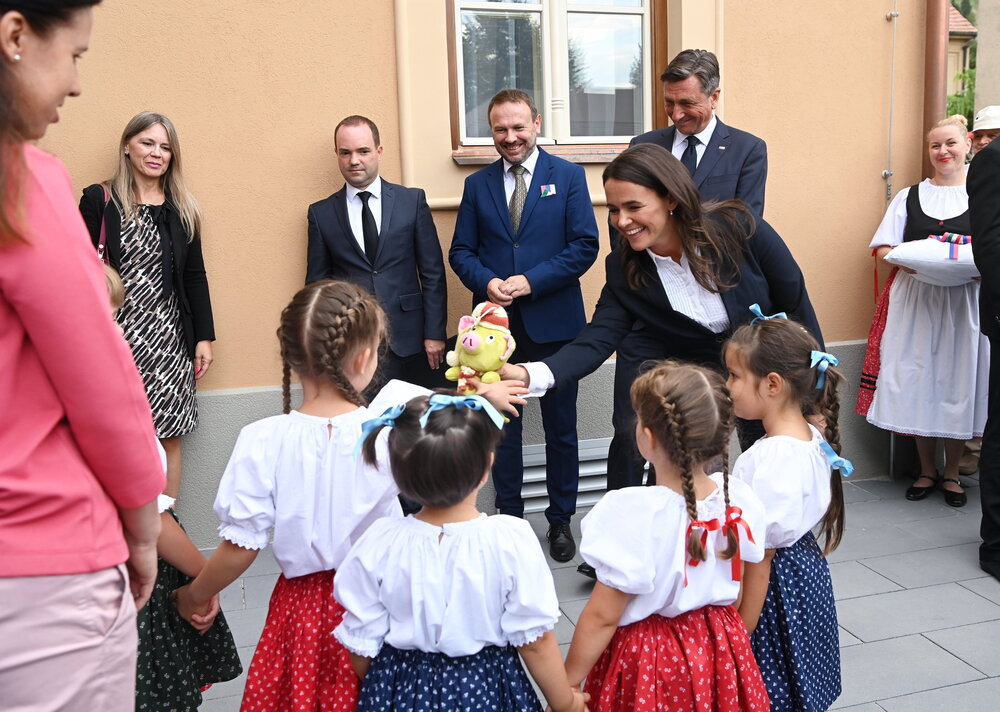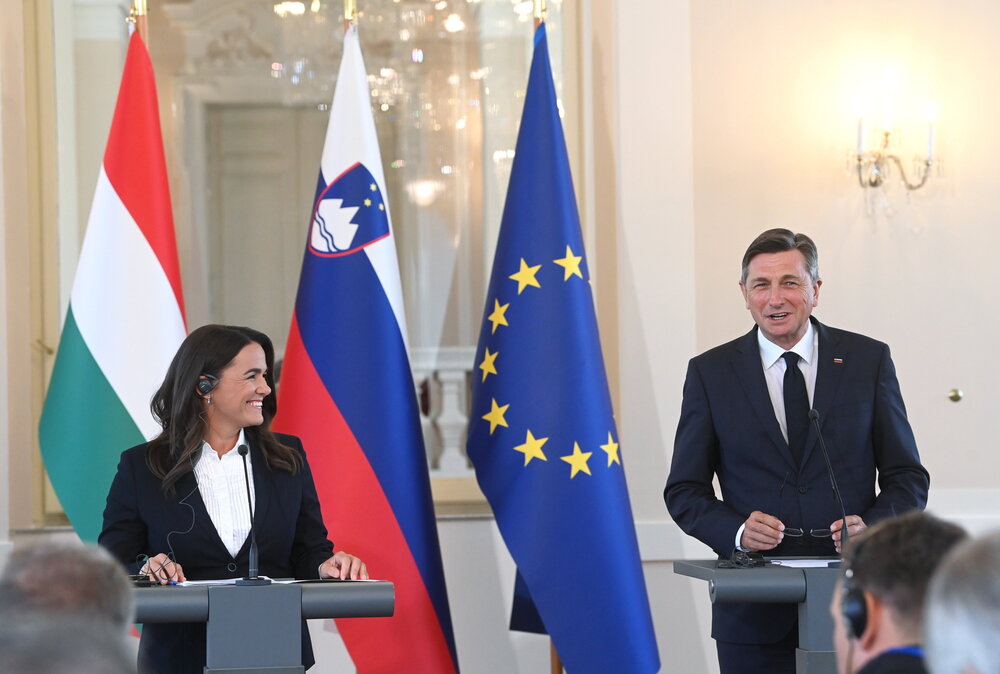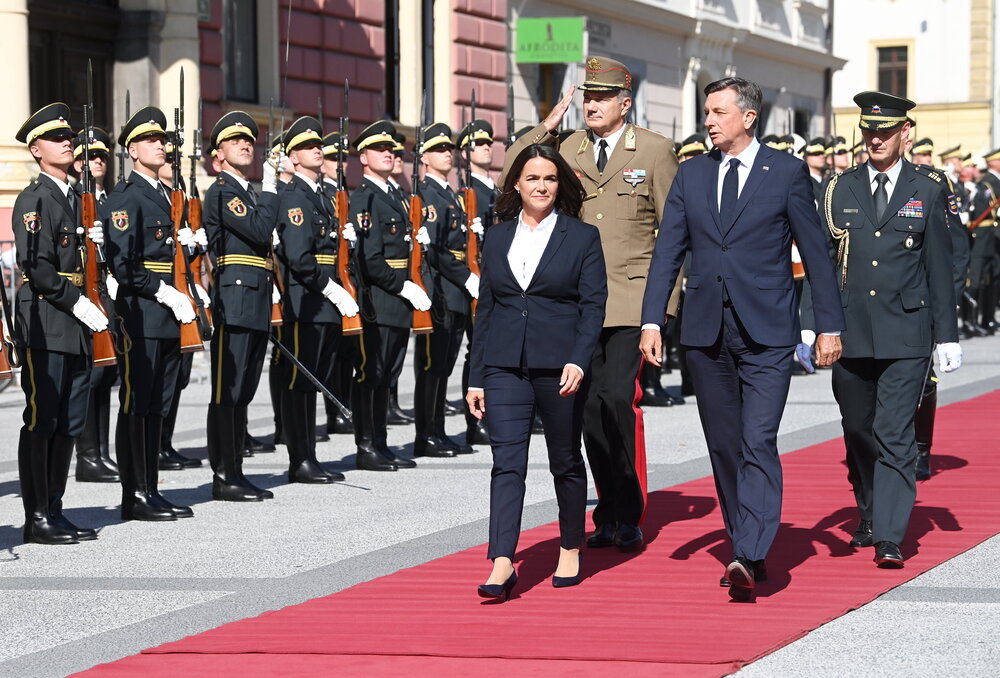Change language:
Hungarian minority headquarters opened in Lendava, Slovenia – PHOTOS

Presidents Katalin Novák of Hungary and Borut Pahor of Slovenia attended the opening of the new headquarters of the Prekmurje Hungarian local government ethnic community (MMÖNK) in Lendava (Lendva) on Friday afternoon.
At the event wrapping up her two-day official visit to Slovenia, Novák welcomed that Prekmurje Hungarians are represented in the Slovenian parliament and their rights to their language, education and cultural self-determination are guaranteed. She said that by contributing to the building’s refurbishment the Hungarian government also aimed to help Lendava prosper.
Pahor said “this is a fortunate phase of history for both Slovenians and Hungarians because they live in a sovereign state, with ethnic Hungarians in Slovenia and ethnic Slovenians in Hungary binding together the two nations”. “We, Slovenians and Hungarians are proud of our national identity which we must nurture in Europe, our great common home,” he said.
Ferenc Horváth, the president of MMÖNK, said that “an old dream of the [Hungarian] community has come true”, adding that the new headquarters will help them keep together and preserve their heritage.

Hungarian president in Slovenia: Europe must be united in response to war
Europe must be united in its response to the war in Ukraine, Hungarian and Slovenian presidents Katalin Novák and Borut Pahor told a joint perss conference after their talks in Ljubljana on Friday. The Hungarian president noted that her meeting with Pahor this week was her second since taking office earlier this year and that her visit to Slovenia was her first official trip to a neighbouring country. Novák praised Hungary and Slovenia’s developing economic ties, highlighting their increasingly close cooperation in infrastructure development.
Slovenia’s Prekmurje (Muravidék) and Hungary’s Rábavidék regions on the border are functioning more and more like a joint economic area,
Novák said, noting the two governments have earmarked an annual 5 million euros each for a five-year economic development plan for the region. The president also highlighted bilateral cooperation in the areas of education, culture, heritage protection and science.

Novák thanked Slovenia for their treatment of their Hungarian minorities. “This becomes even more important in a time of war,” she said. Hungarians in Slovenia can live peacefully, preserving their traditions and their mother tongue, and can contribute to Slovenia’s development without having to give up their Hungarian identity, she said, adding that this was also true of Slovenes living in Hungary.
As regards the war, Novák said Europe needed to remain united in its response to the conflict. It should, however, examine the consequences of its decisions before taking them, she added. Europe must make decisions that primarily hurt Russia, she said.

Novák said the war had also resulted in challenges that affect the entire region, such as the energy situation, price rises, inflation and growing migration pressure. Managing these challenges requires stability, which requires resources she said, adding that Hungary also needed access to the European Union funds it was entitled to.
Meanwhile, Novák expressed Hungary’s support for EU enlargement in the Western Balkans, saying that granting candidate country status to Bosnia and Herzegovina and speeding up Serbia’s accession process were in Europe’s fundamental interest.
Pahor thanked Novák for selecting Slovenia as the first neighbouring country to visit in her capacity as president. “This is a courtesy which signals the continuation of good relations between our two countries”, noting his eight meetings held in the previous ten years with former Hungarian President Janos Ader. “We are living in a very complex geopolitical time which is why we need friends,” Pahor said.
He thanked the Hungarian president for her unconditional support for Slovenia’s position on the EU integration of Bosnia and Herzegovina.
Asked about the war in Ukraine, Pahor said Russia attacked its neighbour “in an illegitimate, immoral manner” in which way it has also attacked collective European values. “We must band together to achieve a just peace, because such a peace will only be lasting if the rights of a country that has been attacked is ensured,” the Slovenian president said.
Source: MTI







